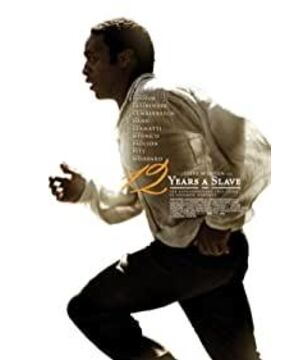"Of course, as there are more than just a gangster movie and a western movie now."
This is "Twelve Years of Slaves" director Steve McQuay Because of the dialogue when I met Quentin, who was also filming the subject of black slaves, on the New Orleans studio. Different from the relatively entertaining and authoritarian style of "The Freed Jiang Ge", the original "Twelve Years of Being a Slave" was written by blacks, and the subject matter is closely related to black slavery. From the director, screenwriter to the starring role, blacks are all in charge-no Denied, "Twelve Years of Being a Slave" has a stronger black color.
And as Mr. Bass (played by Brad Pitt) in the film said: "The law is determined by man, and the truth is permanent." The connotation of "Twelve Years of a Slave" has its own transcendence of race and time and space. . The film's depiction of the black slaves of that era almost points to a metaphor with implied fatalism in human development, that is, the loss of individual identity in the rift of survival in history, and self-redemption is the arduous road to escape from "disqualification".
The story takes place in the United States in the 1840s and 50s. The identity difference between the North and South black free men and slaves constituted a dominant fault at that time. And the deeper rift is rooted in the traditional concept of natural law-the natural law as the basis of "free and equal" does not eliminate the traditional concept of race: blacks are born inferior. In combination with hierarchical religious concepts, the freedom and equality that blacks desire is actually bestowed by whites. Therefore, many abolitionists are not racial egalitarians (including Lincoln and Emerson, etc.). This idea, which seems extremely contradictory and even hypocritical from the current point of view, was already a difficult step at the time. The unfinished "democracy" of the United States still bears a heavy "original sin". The existence of black people fell into such a rift.
From the northern towns to the southern plantations, Solomon crossed regions and fell into the gullies of the value system. In the north, although the identity of free men has not been truly recognized by white people, it at least exists in reality. And when the external foundation on which this individual relied has been stripped away, the identity built on it collapsed, and the surroundings also showed a corresponding dislocation.
The violent conquest of the flesh is the first step in discipline. The thorough pain left scars, and the psychological cues of abuse were poured rampantly. The change of code name further erode the identity of free people. Solomon is no longer Solomon, but Pratt. The environment is full of signs of slavery. The violin is no longer an elegant lyric, but a whitewash when the black mother and child are separated; the "slave" in the "Bible" is repeatedly read aloud, giving surrender and patience a sacred garment; knowledge is no longer the material for happiness, but rather Become the most unbearable arrogance in the hierarchical order.
"No matter where you go, you are a unique nigger." Solomon was dying of lynching for offending white people, the slave owner Ford (played by Benedict Cumberbatch) said. Ford is the most kind-hearted slave owner in the film. What this sentence contains is Ford's deep concern about Solomon's public personality. After the person's subjectivity is completely deprived, all the uniquely shiny scales will also be cut off. The materialized person is confined to the framework of the labor machine, and no heterogeneous factors are allowed to be revealed. The status of a slave is a person shaped by the environment and the system, but it is also Solomon's only blessing. In the end, he can only choose to hide, and the external discipline and the subject's "disqualification" form a unity.
Under the external configuration of "disqualification", the pull of sinking resembles a great deal, and "self-redemption" is undoubtedly a more difficult choice. The same struggling in the dark, the female slave Patz is a heterogeneous in the black slave community. She is the most efficient cotton picker and the sex slave of the "Nigger Killer" Epps (Michael Fassbender); she is the only one who dances for herself when the master orders the dance; she works all the time, But because of the jealousy of Eps’s wife, there is no soap that can cleanse the body—cleanliness is her external pursuit, and it is also the externalization of the psychological scars she suffered from the rape of Eps. The reason why Epps loves her may not be able to rule out this "heterogeneous" temptation. And I am afraid that more is still the desire for control and abuse-when the miss is mad, the whipping given to her by Eps is more violent than any other black slave. On the one hand, Patz is unwilling to give up the possibility of self-assertion, and on the other hand, he is tortured by abuse. Finally wandering on the cliff of despair to survive.
Solomon chose a more thorough "hidden" to open up a secret path for "self-redemption". After completely "degrading" into an ignorant slave, he gained the trust of more slave owners, and he also tore the opening of external contact from the trust. The remaining berry juice on the plate, the feathers from the poultry, the paper from the grocery store... the details of the film's insertion are laid out one by one. And when we all thought that Solomon was about to regain his "freedom", the whistleblower of the white man once again pushed the story into a desperate state.
"After so many hardships, we inevitably overestimate ourselves, and always feel that we can overcome all difficulties." Solomon wrote in the original book.
At this time, the encounter with Mr. Bass (Brad Pitt) became the ultimate rescue. It is not so much salvation as it is the true understanding and respect of friends. In "Cloud Atlas", Adam Ewing once asked the black slave he rescued: "You are an escaped slave, and I am a lawyer. How can you imagine that we might become friends?" The black slave replied, "A glance is enough." The intersection of Solomon and Bath is similar.
In the end, the success of "self-redemption" was handled extremely restrained by the film. After twelve years of hardship and hatred, the prison of time was instantly disintegrated in the dramatic changes in the image of the children, concentrated in the moment of frosty temple collapse. "Pratt" returned to his suit and leather shoes, and his fatherhood recovered between embracing and unconsciousness. The final subtitles recorded Solomon's continued struggle for the abolition of slavery, such as thick sandpaper rubbing the audience's ears, leaving a heavy lingering sound. Individuals linger in the rifts of the times and finally see the sky, but thousands of individuals still cannot avoid the end of the victims of the times. "Disqualification" is really a last resort, and "self-redemption" is more of a dream in a cage.
The return of actual identities filled the gaps in reality, while the more fundamental problem was not really touched by the film and the history of the time-how to resolve the contradiction between the abolitionist and the white supremacist? When can the so-called "freedom and equality" break away from the shackles of the preset natural law? Such a gap is difficult to completely bridge even in today's society. More directly, whether the film itself is truly a "black perspective" is still worth questioning. Today's "black perspective" is still under the ubiquitous gaze of whites. How can a stable "Oscar proposition composition" truly break away from the restraint of Hollywood white aesthetics?
And if we further deduced from the story of racial slavery, looking back at the current situation of people-
Are the rifts in human existence just because they are more fragmented and imperceptible?
Is the "disqualification" of modern people more secretive than the black slaves of the 19th century?
And how should we dissect it and complete the final self-redemption?
This may be a heavier issue.
View more about 12 Years a Slave reviews











